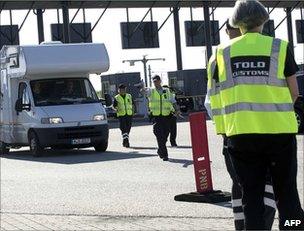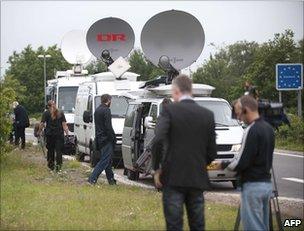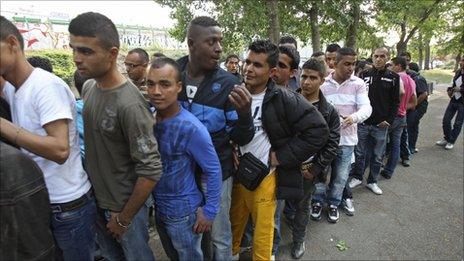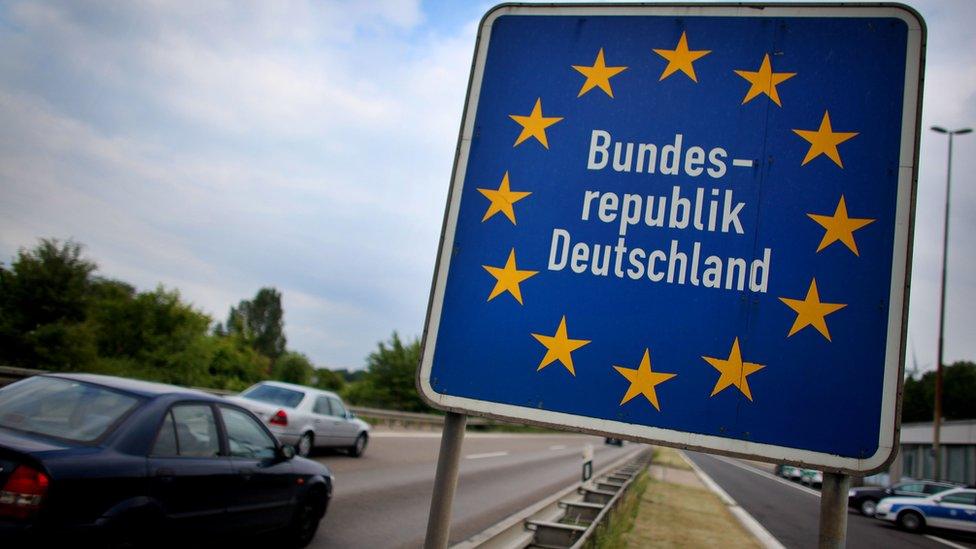Schengen state Denmark beefs up border controls
- Published

Danish customs officers were at work on the Oeresund sea bridge with Sweden
Denmark, part of the Schengen border-free zone, has deployed extra customs officers on its frontiers in a move causing concern among EU neighbours.
Thirty additional officers were being posted on the Danish land border with Germany and 20 others on the country's sea borders.
TV crews crowded on to border crossings to record the first checks, with some media offering live coverage.
Denmark's government is under pressure to curb illegal immigration.
The centre-right coalition moved to introduce the additional customs agents after calls from its populist ally, the right-wing Danish People's Party (DPP), and the legislation cleared parliament on Friday.
Finance Minister Claus Hjort Frederiksen said earlier: "We have seen too many examples of violence, break-ins and brutal criminality committed by perpetrators who have crossed the borders."
But many have questioned the legality of the Danish move under the 1995 Schengen Agreement, which abolished internal borders, enabling passport-free movement inside much of western Europe.
Juerg-Uwe Hahn, justice minister of Germany's Hessen region, told Danish newspaper Jyllands-Posten that Denmark had "ostracised itself".
He was speaking before a meeting of Germany's powerful regional ministers in Berlin this week, which is expected to condemn the Danish initiative.
Bemused motorist
A Dutch motorist appeared slightly alarmed after being stopped by customs officers after she entered Denmark from Germany at Froslev on Tuesday morning, the online edition of Jyllands-Posten reports.

The new controls were extensively covered by media in Germany and Denmark
As the first motorist to be checked, she was asked to pull over 20m inside the border, and found herself being questioned by several customs officers as some 50 media people crowded around her car, the paper says.
Also on Tuesday morning, Danish customs officers could be seen working at the Oeresund sea bridge between Denmark and Sweden.
The Danish reinforcements come on top of a force of about 160, which will grow to 260 by the end of this year, according to Reuters news agency.
Responding to German concerns earlier, Danish officials stressed they did not mean to reintroduce passport controls or hold up travel.
"This is a matter of reinforced customs control where we will go after illegal import of, among other things, narcotics, weapons and large amounts of money, precisely as we do today," tax and customs administration director Erling Andersen said in a statement on Friday.
"There will not be any systematic control of all vehicles and trains that pass the border, and the controls will be carried out with the least possible disturbance to traffic."
Defending the plans back in May, the Danish finance minister said: "Over the past few years we have seen an increase in trans-border crime, and this is designed to curb the problem."
Denmark's ruling coalition of liberals and conservatives relies on the right-wing DPP's support to pass legislation in parliament.
The country must hold its next general election by this November.
- Published4 May 2011

- Published24 April 2016
